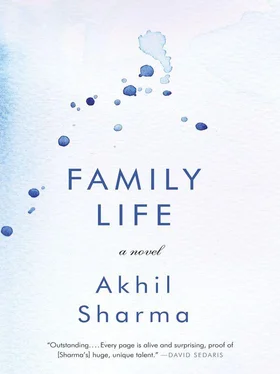Whenever I told someone about Birju, I felt compelled to lie about his wonderfulness. Because we had received so little money in the settlement, which meant that Birju was an ordinary boy, lying seemed the only way to explain that what had happened to him was awful, was the worst thing in the world. Birju, I said, had rescued a woman trapped in a burning car. Birju had had a great talent for music and a photographic memory.
Sometimes I didn’t tell these lies, but only imagined them. I concocted an ideal brother. I took the fact that Birju had told our parents that I was being bullied and turned this into him being a karate expert who had protected me by beating up various boys. These fantasies felt real. They excited me. They made me love Birju and when I was in his room kiss his hands and cheeks. They also cultivated rage at the loss, the way my father’s claims of racism cultivated it for him.
A part of me was anxious about the lies I told. I was afraid of being caught or doubted. Also, making up these stories seemed to serve as evidence that Birju had not been good enough for what happened to him to count as terrible. Each morning I woke on the sofa thinking of the lies I had told. Often I didn’t want to go to school.
At some point, I became aware that Jeff no longer believed my lies. Yet when I came up to him on the playground before school, loyalty demanded that I keep lying. “Birju solved a math problem that professors hadn’t been able to solve for years,” or, “My brother was a very fast runner. Once, he threw a ball straight ahead of him, and he chased it and caught it before it hit the ground.” One morning, when I stood outside school and told Jeff a lie, he stepped back and rolled his eyes.
IN MAY, WE put down our deposit on a house and told the nursing home that we were taking Birju away. The evening of that day, once we had finished dinner, my father put on his shoes to leave.
“You don’t need to go,” my mother said, still sitting on the floor. She said it quietly, looking up at him.
“Stop bothering me.”
After he was gone, I put the dishes in the sink, threw the newspaper in the trash can, and sat down on the sofa with a stack of Time magazines I had borrowed from the school library. I read Time as training, because it was boring and because I needed to be able to do boring things now that we would be caring for Birju. I read an article about the sound quality of LP records compared to that of CDs. I read a book review of a rich person’s biography. Supposedly the rich man was so cheap that he wouldn’t order desserts at restaurants because restaurants provided sweets for free at the ends of dinners. I wondered what kinds of restaurants these were.
My mother came and sat down at the other end of the sofa with her bag of sewing. Around ten, there was scratching at the door, metal on metal. We had heard this once before. That time my father had turned on the lights and stood by the door. He had shouted, “Who is it?” and kicked the door until the burglar went away.
Now, my mother stood by the door. “Who’s there?” she demanded.
There was a chuckle in the hallway. It sounded like my father. My mother yanked the door open. He was crouched in the hallway, trying to fit his key into the keyhole.
He came into the apartment. He walked toward the sofa and half fell onto it.
“Get me some water,” my father said. I went to the sink and poured him a glass.
My mother said, “Come lie down.” She helped him up and led him to the mattress behind the sofa. I brought the glass and handed it to my mother.
A few days later, on Friday night at temple, many different people came and tried to touch my parents’ feet. The news had spread that we were taking Birju out of the nursing home.
“Get up. Get up,” my mother said to a woman bending down before her.
My father said, more roughly, “There is no reason for this.”
At school, I told Jeff that I had seen a swami cause a rope to levitate, and then the swami had climbed the rope and vanished into the sky. I told Jeff that I had seen a swami who was thirsty knock on a wall, and the wall spout water.
One day at lunch I told Jeff and Michael Bu a fairy tale that my grandfather had told me and I claimed that it had happened to my uncle. I told them that one of my uncles in India could speak the language of birds. This uncle had overheard two crows discussing a murder. As I told the story, I leaned forward over the lunch table, feeling the usual panic in my face. “My uncle went to the police station to tell them. The policemen he talked to thought that the only person who could know what my uncle was saying was the murderer, and so they arrested him.”
Michael asked, “Do Indian crows speak the same language as American crows?”
The question baffled me. I sat there silently for a moment. Then, not knowing how to reply, I answered, “Chow wow, eat dog lo mein.”
JEFF AND MICHAEL began to show their dislike openly. It was now June and hot. In the mornings, when I would try to join them in some ordinary conversation, such as last night’s episode of The A-Team , they would turn their backs on me and keep talking. Once, I came up to them on the playground, and they just walked away. When I walked after them, they went faster and began laughing.
One lunch period, I sat down across from Jeff and Michael in the cafeteria and said, “We’re starting to move the furniture that we’ve bought. We’ll move to our house right after school ends, and then Birju will be brought a few days later.”
Jeff and Michael went on with their conversation.
“I’m going to take French next year,” Michael said, keeping his eyes directly on Jeff.
“I’m going to take French, too,” I said. “My brother studied French.” I remembered Birju calling me monsieur and how funny it had sounded.
“Spanish is more useful,” Jeff said, looking at Michael.
“France is a more important country than Spain,” I answered.
“Do you hear something? I don’t hear anything,” Michael said.
“The Spanish teacher seems nicer,” said Jeff.
I said, “On Saturday mornings, nurse’s aides come to Birju’s room and shave his crotch. They do this because of Birju’s urinary catheter. The catheter looks like a condom. To keep it from slipping off, they have to tape it. They don’t want the tape to get caught in the hair.” Jeff and Michael stared at me. They appeared shocked.
“When they do that,” Michael said, “does your brother’s dick get hard?”
Speaking calmly, like I was talking about some ordinary thing, I said, “Birju’s G-tube needs to be changed every six weeks. It needs to be changed or he gets infections. The G-tube is actually two tubes next to each other. The G-tube goes in here.” I pressed two fingers to the right side of my stomach. “One tube is thin and longer than the other and has a balloon at the end. Once both tubes are in Birju’s stomach, the doctor fills the balloon with water. This keeps the tubes from sliding out. The thick tube is what the food goes through. To change Birju’s tube, the doctor takes the water out of the balloon and slides out the tubes.” Jeff and Michael were staring at me, and my voice got higher and higher as I told this awful truth. “When the doctor puts in the new tube, the tube sometimes misses the hole in the stomach. It scratches the outside of the stomach.” I lifted up the two fingers I had been holding against my side. I bent them into a hook and scratched the air. “Sometimes the outside of the stomach starts bleeding.”
Later, during science class, with the lights off because Mrs. Salt was showing a video, I leaned all the way over my desk till my lips were right next to Jeff’s ear. I whispered, “Birju had some X-rays recently, and we discovered that he had broken three ribs a while ago. Maybe some aide dropped him off the bed one night and didn’t tell anyone. For months we moved him and exercised him when he had broken ribs.” Speaking the truth made me feel powerful.
Читать дальше












